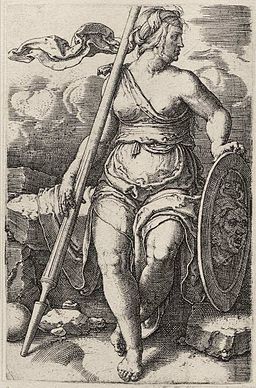
If Justice is blind, then Wisdom is heavily armed.
Science, as an intellectual development and a way of seeing the world in its own right, arose in the time of Robert Hooke (CE 1635 – 1703) and Isaac Newton (CE 1642 – 1727) as a new way of defining truth. The West was coming off more than a millennium where truth had been defined by a narrow hierarchy of authority that had limited research through its own brand of conservatism.
Sometimes we think of science rising up and “conquering” the ignorance of backward times. More accurately, it was a “divorce” of the scientific and academic community from the spiritual power structure, the Church.
One only has to look at the history of medicine and the impact of Galen (CE 129 – 216) to see how much science just had to rebel against. For instance, the work on the circulatory system published by Galen in the 2nd century CE stood until the 16th and 17th centuries. Medicine, up until the advent of science, had been tied heavily with spiritual matters. And as the masters of all religion-related matters, the Church could outweigh any evidence offered.
Next, on Ecumenical Divorce Court…
Science left the Church in a messy and bitter divorce that still reverberates today. After all, that’s what the “debate” around Intelligent Design is really about — how to we define “Truth” as a culture?
So why did Science and the Church split? This drastic, and politically touchy, maneuver was a necessary response to the politicization of religious authority — a politicization that goes at least as far back as the First Council of Nicaea in 325 AD.
For much of that time, at least in the West, the Church had a lock on the Truth. Religious truth, yes. But also academic truth and political truth as well.
The divorce of science and religion was a necessary step in the growth of science and Western Culture as a whole. The Western Church had gotten itself mired in any number of matters. Its unquestioned authority on religious and spiritual matters, when combined with a dash of Neoplatonic theory (the spirit is the source of the physical, God is greater than the world, etc.), allowed justification of one of the greatest power grabs ever.
But…
To be fair, the dissolution of the Western Roman Empire had left something of a power vacuum. It was actually reasonable for an educated, organized elite — the Catholic priesthood — to step in and put some order among the warlords. The Church, one could argue, saved Western civilization.
In the long run, the Church had ended up with “too much” authority outside of its own bailiwick — 1,300 years of institutional empire-building will do that. The growing academic system of the West eventually started straining at its leash. By Copernicus’s time (1472 – 1543) things were getting testy, and by Newton’s, science was ready to spring forth — like Athena from the head of Zeus.